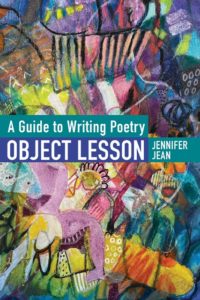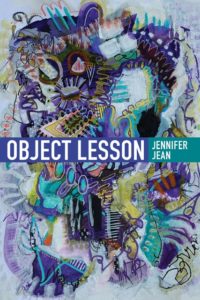
 Review by Lara Lillibridge
Review by Lara Lillibridge
Object Lesson: A Guide to Writing Poetry by Jennifer Jean is a 25-page teaching manual designed to be used with or without the chapbook Object Lesson by the same author. If you don’t have the book, there are substitute poems listed that are “easily found online.”(3)
Jennifer Jean is the founder of Free2Write Poetry Workshops for Trauma Survivors, and this book is based on the curriculum she developed. This guide was designed for use by teachers, book clubs, and workshop facilitators working with trauma-affinity groups. I was interested in this book to develop my own poetry writing habit. I have a Masters in Fine Arts in Creative Nonfiction, but have never done much with poetry—I was excited to read it, because poetry is one genre that eludes me.
I first attempted to use the book with the online reference poems alone, but was frustrated by the experience of flipping back and forth, reading, stopping to search online, going back to the book, and going back to the internet. If you are an individual using this book to improve your writing, I recommend you purchase both books for simplicity’s sake. Besides, the poems in the chapbook are devastating, gorgeous, and worth reading. (For the sake of this review, though, I will be focusing only on the craft book.)
If you are using this as a workshop leader and have prepared all the materials in advance, using the online poems would work nicely. Depending on the nature of the goup, a teacher or workshop leader might also choose to use the online poems, as the poems in the chapbook Object Lesson might be triggering to some participants.
As a new writer of poetry, I found this short guide was extremely helpful. Jean writes,
A poem is like a lucid dream—where everything, even an impossible thing, seems real. Poems are the dreams that haunt, inspire, and change us; they reside in us. (5-6)
She simplifies the writing process in easy to digest chunks: language, image, line, and revision, with additional chapters introducing the workshop model and giving advice on creating a chapbook or anthology.
Each section contains a writing lesson filled with examples to dissect, such as this one with respect to Object Lesson (the chapbook):
What changes in the following poems when a word (or phrase) is substituted with another word (or phrase):
In “#CarryThatWeight” the word “broken” is substituted with “assaulted.”
In “Object Lesson,” the phrase “American Girl Doll” is substituted by the words “action figure.” (10)
The instructions are adapted for substitute poems:
Choose five important words in each poem and use your Thesaurus to find synonyms that could replace these words. Read the new version of the poem aloud. Is the poem substantially different because of these new words? Why or why not? (11)
It was interesting to see how the poem’s meaning could shift with just one word substitution. I found Jean’s style to be clear and easy to follow, and the prompts at the end of each chapter practical. For example:
Write It:
— Write a poem using a framing device (a repeated sentence at the beginning and the end of the poem).
— Write an epistolary (a poem written in the form of a letter).
— Write a prose poem (a poem not broken into lines). (8)
(The author gives several additional prompts for different forms or approaches to a poem).
This book made me break down poetry to really understand how it worked, and then apply it to my own writing. I think it would also be an invaluable tool for trauma-affinity groups to use to help participants make art out of trauma, and therefore have power over their memories, but it is just as useful for an individual looking to learn to write poetry on their own.
Object Lesson: A Guide to Writing Poetry (Companion to Object Lesson) by Jennifer Jean
Lily Poetry Review Books, 2021, $10.00
ISBN: 9781734786989
Lara Lillibridge is the author of Mama, Mama, Only Mama (Skyhorse, 2019), Girlish: Growing Up in a Lesbian Home (Skyhorse, 2018) and co-editor of the anthology, Feminine Divine: Voices of Power and Invisibility (Cynren Press, 2019). Lillibridge is the Interviews Editor at Hippocampus Magazine and a mentor with AWP’s Writer to Writer program.
